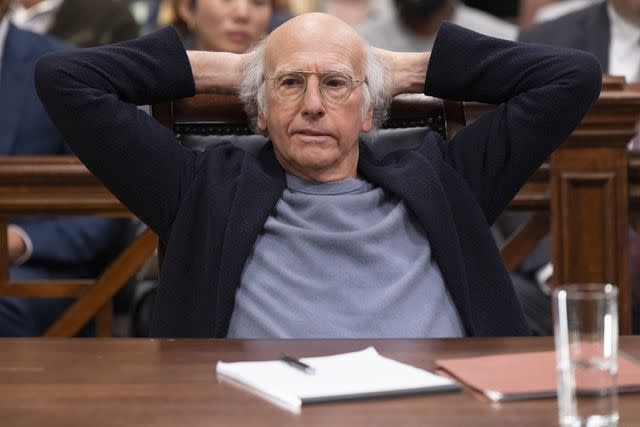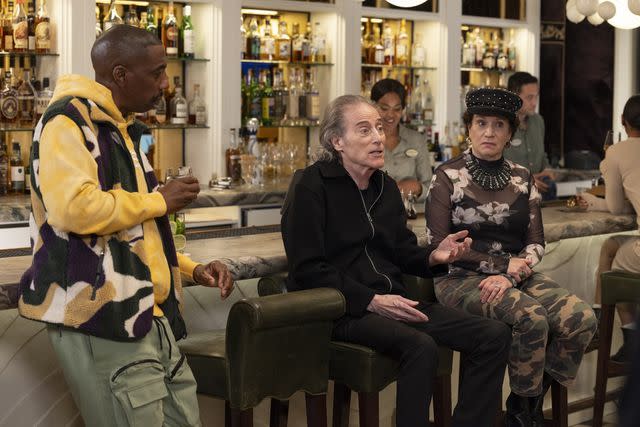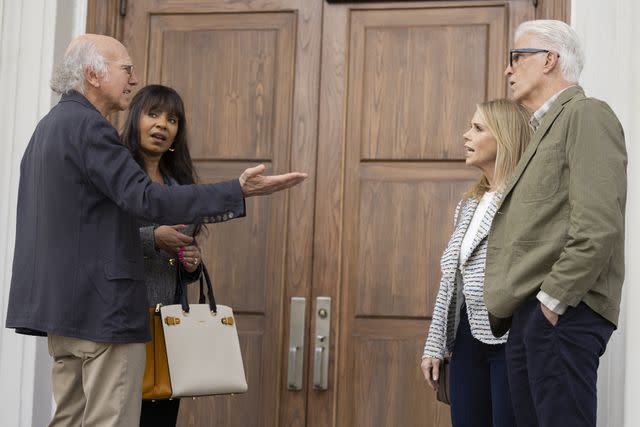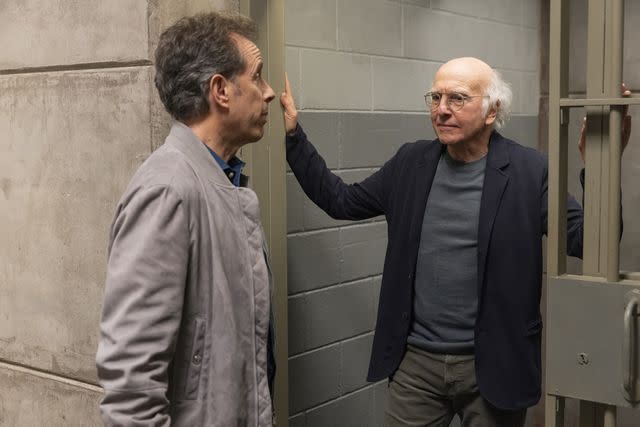“Curb Your Enthusiasm” series finale review: Larry gets his “Seinfeld” do-over
Larry David, the king of grievance, hangs up his crown with "No Lessons Learned."
Warning: This article contains spoilers about Curb Your Enthusiasm's series finale, "No Lessons Learned."
“I’m 76 years old, and I have never learned a lesson in my entire life!”
So boasted Larry David, Seinfeld co-creator and celebrity curmudgeon, in the series finale of Curb Your Enthusiasm. But that was TV Larry talking. The real Larry David — who played a “heightened” version of himself on Curb — turned “No Lessons Learned” into a mea culpa for the looming series finale sin of his past. Rather than serving viewers a steaming cup of spite, David and showrunner Jeff Schaffer wrapped up Curb’s quarter-century run with a cocktail of nostalgic callbacks, celebrity cameos, petty grievances, and a characteristically cynical attempt at redemption.
Before he turned griping about minutiae — the “stop-and-chat,” save the dates, and so much more — into an art form on Curb Your Enthusiasm, David helped create television’s first-ever sitcom antiheroes with Seinfeld. But at their worst, Jerry, Elaine, George, and Kramer never reached the anti-social heights — depths? — of their miserable maker. In Larry David: Curb Your Enthusiasm, the 1999 HBO special that served as a pilot for Curb, Jason Alexander recalls his confusion over George’s behavior in an early Seinfeld episode. “This would never happen in real life, but certainly, if it did happen in real life, no one would react like this,” he told the writers. “And Larry came up and he said, ‘This happened to me, and this is exactly what I did.’”

John Johnson/HBO
Larry DavidIt made sense that George Costanza — a frequently unemployed, romantically challenged schmuck — would live his life in a state of permanent umbrage. And it’s completely absurd that Curb Your Enthusiasm’s Larry David — a millionaire with a beautiful wife (Cheryl Hines) and no legitimate responsibilities — somehow found even more to complain about. “Everything in his environment and his context of his life has been changed,” noted Jerry Seinfeld in the special. “Everything. And he is absolutely the same.”
That disconnect served as the foundation of Larry’s farcical Curb follies over the next 24 years. The affronts took many forms (a bathroom door with no lock! Cold coffee! Faulty weather forecasts!), and the payoff for his pettiness was often humiliation, condemnation, or reluctant remuneration. Though his “character” endured endless (and often earned) abuse, for the real Larry David, TV Larry David was an outlet for his id. “On the show, I can say the things I think about, which I can't say in life," he told Entertainment Weekly in 2002. "I can get into arguments that I wouldn't get into.”
For viewers, it was intoxicating to watch — what must it be like, having the privilege to be such an a-hole? — and for the many celebrity guest stars, Curb offered them a chance to indulge the worst versions of themselves. Was there anything as sublimely sinister as Michael J. Fox, universally beloved actor and philanthropist, trolling downstairs neighbor Larry and blaming it all on his Parkinson’s? Seinfeld spawned countless imitators, but Curb Your Enthusiasm is now its own genre — the Kleenex of celebrity mockumentaries. (“Pete Davidson to play himself in Curb Your Enthusiasm-like comedy.”)

John Johnson/HBO
J.B. Smoove, Richard Lewis, and Susie Essman in the 'Curb Your Enthusiasm' series finaleDavid’s creative process — he wrote detailed outlines for each episode, but let the actors improvise their way from point A to point B — only served to enhance the veracity of what we saw on screen. Characters on Curb interrupt and talk over each other, sputter out incomplete sentences and react like people do in a real conversation — because that’s what they were. (Almost.) Whether an episode was great or just okay, it was always a joy to see one of Curb’s ad-lib all-stars, usually J.B. Smoove or the late Richard Lewis, elicit a genuine laugh from Larry. In our rational minds, we knew it wasn’t real. Still, when a newly divorced Ted Danson (a recurring player throughout the series run) started dating Larry’s ex-wife in season 10, Danson had to assure worried fans that he and Mary Steenburgen were, in fact, still married in real life.
Eleven seasons, 120 episodes, so many of which are now considered classics in the annals of cringe comedy. Personal preferences may vary — nothing Larry said will ever be funnier to me than, “Let me tell you something: I do hate myself, but it has nothing to do with being Jewish, okay?” — but most of us can agree on the all-time greats. "Palestinian Chicken." "Trick or Treat." "Seinfeld." "The Doll." "Krazee-Eyez Killa." "Lewis Needs a Kidney." Curb took a six-year break after season 8, and another three-year break after season nine. Each time, no one, not even the suits at HBO, knew if Larry would be back.

John Johnson/HBO
Larry David, Sanaa Lathan, Cheryl Hines, and Ted Danson in the 'Curb Your Enthusiasm' series finaleStill, back he came for three more seasons, and each one delivered diminishing comedic returns. The weekly peccadilloes Larry faced felt increasingly forced, and his screwball strategies to escape social obligations were less and less grounded in reality. (This season’s seventh episode, “The Dream Scheme,” might be the series’ nadir.) Despite the lack of laughs, at least season 12 had a clear purpose: Redemption.
“He’s not at peace with himself after he bombs, until he goes up onstage again and does well,” explained Larry's manager, Jeff Greene (Jeff Garlin), in the original Curb special. And the Seinfeld finale — which Larry David returned to write after leaving the series in season 7 — is preserved in pop culture amber as a certified bomb. So, just as Seinfeld’s final episode found the core four stand trial violating a Good Samaritan law, Curb’s final season saw Larry being arrested and tried for being a Good Samaritan. (Technically, he violated Georgia’s Election Integrity Act, which prohibits handing out water or food to people waiting in line to vote.)
The 56-minute “No Lessons Learned” follows Larry and his posse of supporters — Jeff, Susie (Susie Essman), Leon (Smoove), Richard, Cheryl, and Danson — down to Atlanta for the trial. No matter how many times his lawyer, Sibby Sanders (Sanaa Lathan), tries to impress upon him how grave his situation is — “If you get convicted, you’ll be a felon!” — Larry is pathologically incapable of taking the proceedings seriously. As ever, he remains myopically focused on minor things: Proving that Lewis’ girlfriend, Cynthia (guest star Allison Janney), is lying about her suicide attempt; helping Jeff trick Aunt Rae (Ellia English) into giving him her salad dressing recipe; scolding Danson for trying to steal his “limelight” by protesting the Election Integrity Law outside the courthouse.
And as Larry confesses to Jerry Seinfeld, who also comes to Atlanta in a show of support, he’s not even thinking about the trial during the trial. Their subsequent exchange — about a hypothetical romance with a beautiful bearded lady — was the finale’s best moment, a pure and potent hit of the duo’s singular dynamic.

John Johnson/HBO
Jerry Seinfeld and Larry David in the 'Curb Your Enthusiasm' series finaleMuch of the episode played out as a deliberate remake of Seinfeld’s “The Finale,” with people from Larry’s past — Mocha Joe (Saverio Guerra), Rachel Heineman (Iris Bahr), even little Tara Michaelson (Bailey Thompson), now all grown up and still traumatized by that hug so many years ago — taking the stand to testify about their David-induced trauma. “Larry David doesn’t respect the law,” prosecutor Earl Mack (guest star Greg Kinnear) warns the jury. “He lives outside, unrestrained by the guardrails of human decency.” And like Jerry, Elaine, George, and Kramer, Larry David is convicted and sentenced by the judge (guest star Dean Norris) to a year in prison.
Just when it seems that Curb was going to end as it began — with Larry fretting about his "pants tent" — along came that twist. A slender, seemingly irrelevant string of connective plot tissue that loops back to save the day. Jerry himself delivers the news — “Mistrial declared! Charges thrown out!” — and as he and Larry stroll out of the jail, Larry has a revelation. “Oh, my God. This is how we should have ended the finale!” Does actual Larry David believe that, or is he just giving fans what he thinks they want so they’ll get off his back already? My sense is the latter, but I’m not sure it really matters. What's most important is that "Larry David," comedy's most indefatigable antihero, is free to live unhappily ever after, learning nothing along the way.
Series finale grade: B
Overall series grade: A-
Sign up for Entertainment Weekly's free daily newsletter to get breaking TV news, exclusive first looks, recaps, reviews, interviews with your favorite stars, and more.
Related content:
2024 Emmy nomination predictions: Outstanding drama, comedy, and limited series
Lori Loughlin was 'totally game' for self-deprecating Curb Your Enthusiasm appearance
Richard Lewis, lovably neurotic comedian and Curb Your Enthusiasm star, dies at 76
Read the original article on Entertainment Weekly.


